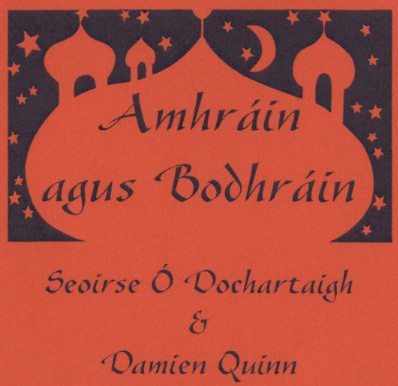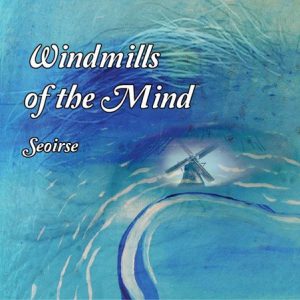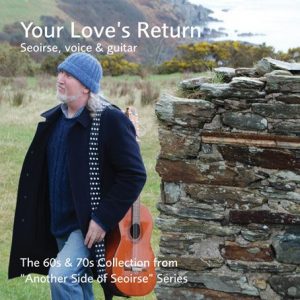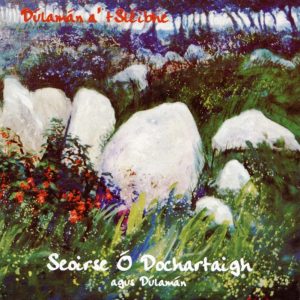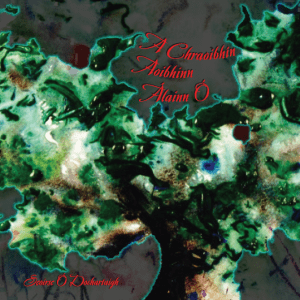Description
NOW OUT OF STOCK
(but soon available as mp3 downloads)
This live concert is superbly recorded, incisive and full-bodied. Here are unusual performances of Irish songs in which virtuosity goes with a sense of spontaneity. The rhythms in the fast songs (and its nearly all fast songs here) are freely and infectiously sprung to bring out high spirit and individuality. The sound is bright and clear too, giving extra bite to the performances. Damien Quinn accompanies Seoirse sensitively, when required, and vigorously with off-beat rhythms sharply pressed home. The playing and singing are exhilarating and full of many unexpected changes of tempo, but expertly controlled. The thrust of the bodhrán passages in the opening song possesses a lively wit that never once looses impetus. Seoirse’s colourful, winning performances are totally idiomatic, bringing out point and spark in every track with great warmth and naturalness of voice and exciting guitar bravura throughout.
Oisín Ó Gallchóir
Amhráin agus Bodhráin
Seoirse Ó Dochartaigh, lead vocal & guitar
Damien Quinn, bodhráns
- The Moving On Song (Ewan McColl) 4:46
- Deoíndí (arr. S. Ó Dochartaigh) 2:46
- The Bonny Black Hare (arr. S. Ó Dochartaigh) 2:58
- The Flower of Magherally O (arr. S. Ó Dochartaigh) 3:15
- Son ar Chistr’ (arr. S. Ó Dochartaigh) 2:56
- Cailleach an Airgid (arr. S. Ó Dochartaigh) 2:10
- As I Roved Out (arr. S. Ó Dochartaigh) 3:50
- An Spailpín Fánach (arr. S. Ó Dochartaigh) 1:13
- An Fhalaingín Mhuimhneach (arr. S. Ó Dochartaigh) 3:15
- Máire Bhruinneall (arr. S. Ó Dochartaigh) 2:10
- Aililiú na Gamhna (arr. S. Ó Dochartaigh) 3:50
- Rocky Road to Dublin (arr. S. Ó Dochartaigh) 3:09
- Raithineach, a Bhean Bheag (arr. S. Ó Dochartaigh) 3:11
- Dúlamán (arr. S. Ó Dochartaigh) 4:24
Bonus track
- Improvisions on “Ca’ the Yowes To the Knowes”
for two guitars, two voices and percussion (arr. S. Ó Dochartaigh) 5:38
Production: Seoirse Ó Dochartaigh
Engineers: Cathal Boyle & Lesley Long
Mastering: Leslie Long
Notes: Seoirse Ó Dochartaigh
Recorded live in The Stables (now The Castle Bar), Donegal Town, 17th Dec. 1993, except Tr. 15, recorded in London 1995.
All percussion tracks (except tr.15) arranged by Damien Quinn
Tr. 1 Harmony Music. All other tracks arr. Seoirse Ó Dochartaigh IMRO, PRS, MCPS © & P
- The Moving On Song
A Ewan McColl hardy perennial. If we had managed to get a studio version of this song, the link tune (lilted here) would probably have been played on some ancient Romany instrument, if such a thing existed. The link is a Breton dance tune. As it stands, it’s as good as it gets, considering we had only two pairs of hands on the occasion! Incidentally, the line that goes “The eastern sky was full of stars…” suggested the idea for the album cover.
- Deoíndí
This is an untranslatable children’s song from Conemara. We did do a studio version of this (see “Bláth Buí” ), but on that occasion we brought tin whistles in and dispensed with the bodhrán. The percussive take, cobbled together here for the live gig, resulted in a completely different kind of song. The tune in the bridge is an old clan march called “Fead an Ioláir” (The Eagle’s Whistle) associated with the O’ Donahues of Killarney.
- The Bonny Black Hare
I learned this from an LP. It’s cool to say that these days. Years ago, purists would have had you lynched for admitting it. Martin Carthy was the singer and in the sleeve notes it is stated that the source of the song was an Irish labourer called Mr. Morrow who sang it in Walberswick, Suffolk, in 1938. The time signature is a rare one: 9/8 (3+3+3) and “mixed” 8/8 (3+2+3).The theme is even rarer. Final score in the Sexual Premiership: woman 6 man 0!
- The Flower of Magherally O
This song takes its form from the aisling (dream) genre of Gaelic poetry where the poet falls
asleep and in his dreams encounters a beautiful woman who represents the soul of Ireland.
She prophesizes that Ireland will someday be freed from her chains of bondage. The damsel in
this song – Sally – although quite a stunner, has no political message to impart. This is
adoration, pure and simple, and, if he gets his way, the poet will bring his Sally home to roost,
despite the begrudgers. It’s set to a fine tune. Magherally was the ancestral home of the Brontë
(O’Pronty) family. I often wondered if Emily’s father Patrick ever heard the song in his
childhood.
- Son ar Chistr’
My dear friends Claude and Yann-Ber from Brittany tutored me in the singing of this cider-drinking song when I was on tour there. (I hope my pronunciations are correct.) When I finally mastered it I was pestered to sing it again and again and again by an inebriated Breton nationalist at a festival in Rennes. He stuffed bundles of French Francs into my top pocket and yelled: “Son ar Chistr’! Son ar Chistr’! A free Brittany for a better Europe!” That was his war-cry. One wonders what cider-drinking has to do with independence, but Son ar Chistr’ is one hell of a good rousing tune, you’ll have to admit.
- Cailleach an Airgid [Sí Do Maimeó Í]
This is a real “fun” song, as they say in America. It’s a jig – Hag with the Money – with words sung to it. All about a rich widow who would drink all your money and “eat meat on Fridays and Saturdays!”, so she’s something of a sinner, and that makes her all the more endearing. I just use a simple modal two-chord pattern on the guitar here but I never get tired of it. Cailleach an Airgid has been covered by many Irish bands, but every band has its own way of doing it.
- As I Roved Out
Many Irish songs – all different – begin with “As I roved out…”, but this is perhaps the most poetic of them all. The language in it is pure Shakespeare, willow tree and all, but sung to such an exquisite Irish melody! It was popularised by Andy Irvine of Planxty. Co. Fermanagh is the setting and the source Paddy Tunney – the great balladeer from Beleek.
- An Spailpín Fánach
The word spailpín comes from two Gaelic words: speal [scythe] and pingin [penny] – the
itinerant farm worker of old. This short song is a pen-picture of one such spailpín. The tune
travelled to America in the 19th century and became popular as “The Girl I Left Behind Me”.
Our version could have been longer here but the sound engineer had the pause button of the
recorder on for the first verse!
- An Fhalaingín Mhuimhneach
When this song was made they threw away the mould! Essentially it’s a traditional Gaelic song from Kerry about a cloak of many colours, sung to a…Spanish melody? The tune appears in print for the first time in Ireland in the Cooke collection of 1793 as the second part of “The Bonny Black Irish Maid”. To complicate matters, the Spanish composer Granados uses the exact same tune in No. 6 of his “12 Spanish Dances for Guitar” published in 1893. The people of Kerry believe that a survivor from the Spanish Armada introduced the tune to their community in the late 1500s when he settled in the area. Presumably his guitar survived the wreckage too! It would have been ideal to have performed this on my Spanish guitar but a string broke just before the recording started.
- Máire Bhruinneall
A man finds himself in a seachrán sí, a trap made by the fairies in a lonely wooded place. He falls in love with one of the fairy women – golden hair in ringlets tumbling down around her snowy-white breast, voice more melodious than the call of the cuckoo… He follows her everywhere like a man possessed. But she disappears… into thin air…
This is a guitar-enhanced version of the studio recording Damien and I made using a variety of percussion instruments over an upright base (see Oíche go Maidin). Once again, the live version with guitar and bodhrán changes the overall effect considerably.
- Aililiú na Gamhna
In a way the treatment given here to this rather dainty pastoral song conflicts a good bit with the subject-matter of the song: a milkmaid, her milking pails, her calves and cows, her languid summer pastures… But the chord structure of the melody lends itself easily to a bluesy feel. Sorry if we have offended anyone in the dairy industry here but we couldn’t resist the groove!
- Rocky Road to Dublin
A big hit with the Dubliners many years ago but is still a good song if somewhat overlooked. It used to be considered a difficult song to sing but I got to work on it in my early days of folk-singing so it came out fairly naturally when Damien lifted his bodhrán that evening. It was the first time we tried it out either publicly or privately. This is where the “Quinn” style of playing becomes quite evident.
- Raithineach, a Bhean Bheag
Steampaí is a special cake made from grated raw potato mixed with flour, squeezed dry, baked
and left to sit overnight. It is usually served up with a daub of butter. And this, more or less, is
what they’re cooking in Barranaheena.
Three groups of women cook: big blonde ones, big buxom ones, and women with blonde
crowns in their hair! Barranaheena is in County Cork and was, evidently, once the Punk hair
style capital of the western world.
But the quality of the steampaí varies – from potent, energetic pies to hard lumpy things that
give you blisters in your gums.
Now you know.
- Dúlamán
This is where Damien holds his own. Unless I’m mistaken, this is the first concerto ever devised for solo bodhrán. The song is really just a lead-in to show-piece the talents of the percussionist.
I should say though that the song – discovered by me in a library in Dundalk in the early 1970s – was wrongly interpreted. The correct dotted rhythm should have been a kind of strathspey but I gave it a straight 4/4 by mistake. The “mistake” was passed on to Clannad, then to Donal Lunny, then to Anúna and then to a whole host of other bands including a techno outfit called Hyper-Borea who gave it the disco treatment. I have to laugh. They all got such mileage out of my old “mistake”. It’s a pity I didn’t copyright it!
Another version of the song, with melody composed by me this time, appears on the Dúlamán a’ tSléibhe album. My band at the time was also called Dúlamán and we were toying with the idea of calling the new song “Dúlamán The Revenge” but settled in the end for the more poetically alliterative Dúlamán na Binne Buí”.
- Improvisions on “Ca’ the Yowes To the Knowes”. This began life – believe it or not – as
a simple arrangement for two unaccompanied voices. Ca’ the Yowes is a Scottish folk song
collected by Robbie Burns. The vocal harmony I worked out was based on a guitar
chord sequence.
The lead voice was intended for Heather and I was to sing the counter melody. Little did
we know that when were leaving the studio in London were carrying a recording of a
fantasia for many voices! How did this come about? Simple! It could happen to anybody.
Steafán suggested that I re-instate the guitar chords at the beginning, middle and end of the
song and he then proceeded to add a whole range of percussion sounds, including a sample
from the vocal mix. That done, he then phoned ace guitarist Don Paterson, who arrived at the
end of the session and improvised, rather brilliantly, on my humble chords.
Don Paterson, from Scotland, is an award-winning poet. He is also – evidently -an
exceptionally gifted musician. Heather Innes is a Scottish singer of note with several highly
acclaimed albums to her credit. Steafán Hannigan is an Irish-born multi-instrumentalist, once
in great demand in the UK, now resident in Canada. Heather and Steafán have performed
in various bands with Seoirse, incl. Donegal Folkweave and Dúlamán.
The Moving On Song
(Go! Move! Shift!)
(Ewan McColl)
Born in the middle of the afternoon
In a horse-drawn carriage on the old A5.
The big twelve-wheeler shook me bed
“You can’t stay here” the policeman said.
Chorus
“You’d better get born in some place else”
Move along, get along
Move along, get along
Go! Move! Shift!!
Born to the common by a building site
Where the ground was rutted by the trail of wheel
The local Christians said to me
“You’ll lower the price of property”
Born at tatie lifting time
In an old gold tent by a tatie field
The farmer said “The work’s all done,
It’s time that you was movin’on”.
Born at the back of a hawthorn hedge
Where black moar frost lay on the ground.
No eastern kings came bearing gifts
Instead the order came to shift.
The eastern sky was full of stars
But one shone brighter than the rest
The wisemen came so stern and strict
And brought the orders to evict.
Wagon, tent or trailer born
Last month , last year or in far off days
Born here or a thousand mile away
There’s always men nearly who’ll say
Chorus
“You’d better get born in some place else”
Move along, get along
Move along, get along
Go! Move! Shift!!
Deoindí
Deoindí ó deighdil lum
Is tá mo ghrá chomh deas
Deoindí ó deighdil lum
Nach bhféadaim éirí as
Is Deoindí ó díó deighdil lum.
Deoindí ó deighdil lum
Is tá mo ghrá chomh deas
Deoindí ó deighdil lum
Le gloime i dteach an óil
Is Deoindí ó díó deighdil lum.
Deoindí ó deighdil lum
Is tá mo chroí chomh trom
Deoindí ó deighdil lum
Le cloch a chaithfí i dtom
Is Deoindí ó díó deighdil lum
Deoindí ó deighdil lum
Nach iomaí cor is cleas
`Do chroí nach bhfuair mé `mach
Is Deoindí ó díó deighdil lum
Deoindí ó deighdil lum
Neantóga is bláth buí
Deoindí ó deighdil lum
Tá fás ar áit mo thí
Is Deoindí ó díó deighdil lum
Deoindí ó deighdil lum
Murach an droch-shaol
Deoindí ó deighdil lum
Bheadh mo mhuintir cruinn
Is Deoindí ó díó deighdil lum
The Bonny Black Hare
On the fourteenth of May at the dawn of the day
With me gun on me shoulder to the wood I did stray
In search of some game if the weather proved fair
To see could I get a shot at the bonny black hare.
Oh, I met a young girl her with the face of a rose
Her skin was as fair as the lily that grows
I said “me fair maiden why ramble you so
Can you tell me where the bonny black hare do go?”
Oh, the answer she gave me, her answer was “no”
“But under me apron they say it do go
And if you’ll not deceive me oh I vow and declare
We’ll both go toghe’r to shoot the bonny black hare.
Oh, I laid this girl down with her face to the skies
I took out me ramrod and me bullets likewise
I said lock your legs round me and dig in with your heels
For the closer we get love, the better it feels.
Now the birds they were singing in the bushes and trees
The song that they sang was “Oh she’s easy to please”
I felt her heart give and I knew what I’d done
Says I “Have you had enough of me old sporting gun”.
Oh, the answer she gave me her answer was “nay”
It’s not often young sportsman that you come this way
But if your powder is good and your bullets play fair
Why don’t you keep firing at me bonny black hare.
Oh, me powder is wasted and me bullets are gone
Me ramrod is limber and I cannot fire on
But I’ll be back in the morning and if you are still there
We’ll both go again to shoot the bonny black hare.
The Flower of Magherally O
One pleasant Summer’s morning
when all the flowers were springing O,
Nature was adorning and the wee
birds sweetly singing O,
I met my love near Banbridge town,
my charming blue-eyed Sally O,
She’s the queen of the County Down
the flower of Magherally O,With admiration I did gaze
upon this blue-eyed maiden O,
Adam wasn’t half so much plazed,
when he met Eve in Eden O,
Her skin was like the lily white,
that grows in yonder valley O,
She’s my queen and my heart’s delight
the flower of Magherally O,Her yellow hair in ringlets clung,
her shoes were Spanish leather O,
Her bonnet with blue ribbons strung
her scarlet cap and feather O,
Like Venus bright she did appear
my charming blue-eyed Sally O,
She’s the girl that I adore
the flower of Magherally O,I hope the day will surely come,
when we’ll join hands together O,
It’s then I’ll bring my darling home,
in spite of wind or weather O,
And let them all say what they will,
and let them reel and rally O,
For I shall wed the girl I love,
the flower of Magherally O
Son ar Chistr’
Ev’ chistr’ ta Laou rak, ev chistr’go mat íon-la
Ev’ chistr’ ta Laou rak, chistr go mat
Ev’ chistr’ ta Laou rak, ev chistr’go mat
Ur blank ur blank ar chopinad íon-la
Ur blank ur blank ar chopinad
Ar chistr’go graet eít bout evet íon-la
Ar chistr’go graet eít bout evet
Ar chistr’go graet eít bout evet
Hag ar merc’hed éit but karet íon-la
Hag ar merc’hed éit but karet
N’oan ket c’hoazh tri miz, eureajet íon-la
N’oan ket c’hoazh tri miz, eureajet
N’oan ket c’hoazh tri miz, eureajet
Benn’ vezen banbeiz chikanet íon-la
Benn’ vezen banbeiz chikanet
Cailleach an Airgid
(Curfá)
`Sí do Mhaimeo í, `Sí do Mhaimeo í
`Sí do Mhaimeo í, Cailleach an Airgid
`Sí do Mhaimeo í ó Bhaile Ionais Mhóir í
Is chuirfeadh sí cóistí ar bhóithre Chois Fharraige.
Dá bhfeicfeá-sa an “steam” ‘ghabháil siar Tóin Uí Loing’
`s na rothaí ghabháil timpeall siar ó na ceathrúnaí,
Chaithfeadh sí an stiúir naoi n-uaire ar a cúl,
Is ní choinneodh sí siúl le Cailleach an Airgid.
Measann tú `bpósfa, measann tú `bpósfa,
Measann tú `bpósfa, Cailleach an Airgid?
Tá a fhios a`m nach bpósfa, tá a fhios a`m nach bpósfa,
Mar tá sé ró-óg is d’ólfadh sé an t-airgead.
Tá beirt `ghabháil a phósa, tá beirt `ghabháil a phósa,
Tá beirt `ghabháil a phósa, beirt ar an bhaile seo,
Tá beirt `ghabháil a phósa, beirt ghabháil a phósa,
`Síad Seán Shéamuis Mhóir is Máire Ní Chathasaigh.
(Is d’ólfadh sí feoil on Fridays and Saturdays!)
As I Roved Out
1
As I roved out on a bright May morning
To view the meadows and flowers gay
Whom should I spy but my own true lover
As she sat under yon willow tree
2
I took off my hat and I did salute her
I did salute her most courageously
Then she turned around and the tears fell from her
Saying “False young man, you have deluded me”
3
A diamond ring I own I gave you
A diamond ring to wear on your right hand
But the vows you made you went and broke them
And married the lassie that had the land”
4
“If I married the lassie that had the land, my love,
It’s that I’ll rue until the day I die
When misfortune falls sure no man can shun it
I was blindfolded I’ll ne’er deny
5
And at nights when I go to my bed of slumber
The thoughts of my true love run in my mind
When I turn around to embrace my darling
Instead of gold sure ’tis brass I find
6
And I wish the queen would call home her army
From the West Indies, Americay and Spain
And every man to his wedded woman
In hopes that you and I will meet again”
An Spailpín Fánach
Im Spailpín Fánach fágadh mise
Ag seasamh ar mo shláinte
Ag siúl an drúcht’ go moch ar maidin
Is ag bailiú galair ráithe.
Ní fheicfear corrán ‘m láimh chun bainte
Súiste ná feac beag ráinne
Ach bratacha na Fraince os cionn mo leapa
Agus píce agam chun sáite.
Mo chúig chéad slán chun dúiche m’athar
‘gus chun an oileáin ghrámhair
Is chun buachaillí na Cúlach ós díobh nár mhiste
In aimsir chasta na ngarda
Anois ó táimse ‘mo chadhan bhocht dhealbh
I measc na ndúichí fáin seo
Is é mo chuma croí mar a fuair mé an ghairm
Bheith ariamh im Spailpín Fánach.
An Fhalaingín Mhuimhneach
(Curfá)
Falaing ar fhalaing ‘sí an fhalaingín Mhuimhneach í
Falaing ar fhalaing ‘sí an fhalaingín Mhuimhneach í
Falaing ar fhalaing ‘sí an fhalaingín Mhuimhneach í
Falaing chrua chasta ‘s nár chasaidh sí choích’ orainn.
Dá mb’ agam an fhalaing ní thabharfainn don Mhuimhneach í
Ach thabharfainn don scafaire ‘chóireochadh broth mín uirthi.
Fógraim an fhalaing, is iomóg ‘ta daor uirthí
Tá dubh ag dearg, glas-uaine ‘gus buí inti.
Dá mb’agam an fhalaing ní thabharfainn don Mhuimhneach í
Is tuisce do chraithfinn mar easair fém chaoirigh í
Croí cráite ar an fhalaingín cé gur beag suarach í
Is tapaidh do leagfadh sí fear spúir agus buataisí
Máire Bhruinneall
Orú ‘Mháire ‘Bhruinneall ‘Bhláth na Finne
I ndiaidh mé do leanúint aniar anall
Ó ba bhinne liom do bhéal ná na cuacha ‘seinm
‘S tú d’fhág mise i ndealraí ‘n bháis
A mhéid é mo thuirse níor léar domh an choinneal
Deir siad gur mise (a) mheallas na mná
Mharaigh tú go deo mé
Lagaigh tú go mór mé
Is gach a bhfuil beo domh bhris tú mo chroí
Bhí a tríphointe óir léi síos go troigh
Gus í ag carnú ar gach taobh
Mharaigh tú go deo mé
Lagaigh tú go mór mé
Is gach a bhfuil beo domh bhris tú mo chroí
Bhí mé lá go ceolmhar insan ród
Tharla domh-sa ‘n óig-bhean chiúin
Mharaigh tú go deo mé
Lagaigh tú go mór mé
Is gach a bhfuil beo domh bhris tú mo chroí
Orú ‘Mháire ‘Bhruinneall ‘Bhláth na Finne
I ndiaidh mé do leanúint aniar anall
Ó ba bhinne liom do bhéal ná na cuacha ‘seinm
‘S tú d’fhág mise i ndealraí ‘n bháis
A mhéid é mo thuirse níor léar domh an choinneal
Deir siad gur mise (a) mheallas na mná
Mharaigh tú go deo mé
Lagaigh tú go mór mé
Is gach a bhfuil beo domh bhris tú mo chroí
Aililiú na Gamhna
Is iníon d’aoire mé féinig gan amhras
Do bhíodh ina cónaí cois taobh na Leamhna
Bhí bothán agam féin ann is fuinneog i gceann de
Fad a bhíodh an bainne ag téamh agam ‘sea ghlaofainn ar na gamhna
(Chorus)
Aililiú na gamhna, na gamhna bána
Aililiú na gamhna, na gamhna b’iad a b’fhearr liom
Aililiú na gamhna, na gamhna geala bána
Na gamhna maidin shamhraidh ag damhsa ar na bánta
Faightear dom cana is faightear dom bhuarach
Is faightear dom soitheach ina gcuirfead mo chuid uachtair
Ceolta sí na cruinne bheith á síorchur i m’chluasa
Ba bhinne liomsa géimneach na mbó ag teacht chun buaile
Rachaimid ar an aonach is ceannóimid gamhna
Is cuirfimid ar féar iad amach ins na gleannta
Íosfaidh siad an fear is barr an aitinn ghallda
Is tiocfaidh siad abhaile chun an bhainne i gcóir an tSamhraidh
The Rocky Road To Dublin
Well, in the merry month of May, now from my home I started,
Left the girls of Tuam, Nearly broken hearted,
Saluted father dear, Kissed my darlin’ mother,
Drank a pint of beer, My grief and tears to smother,
Then off to reap the corn, And leave where I was born,
I cut a stout blackthorn, To banish ghost and goblin,
In a brand new pair of brogues, I rattled o’er the bogs,
And frightened all the dogs,On the rocky road to Dublin.
(Chorus)
One, two, three, four five,
Hunt the hare and turn her
Down the rocky road
And all the ways to Dublin,
Whack-fol-lol-de-ra.
In Mullingar that night, I rested limbs so weary,
Started by daylight, Next mornin’ light and airy,
Took a drop of the pure, To keep my heart from sinkin’,
That’s an Irishman’s cure, Whene’er he’s on for drinking.
To see the lasses smile, Laughing all the while,
At my curious style, ‘Twould set your heart a-bubblin’.
They ax’d if I was hired, The wages I required,
Till I was almost tired, Of the rocky road to Dublin.
In Dublin next arrived, I thought it such a pity,
To be so soon deprived, A view of that fine city.
Then I took a stroll, All among the quality,
My bundle it was stole, In a neat locality;
Something crossed my mind, Then I looked behind;
No bundle could I find, Upon my stick a wobblin’.
Enquirin’ for the rogue, They said my Connacht brogue,
Wasn’t much in vogue, On the rocky road to Dublin.
From there I got away, My spirits never failin’
Landed on the quay As the ship was sailin’;
Captain at me roared, Said that no room had he,
When I jumped aboard, A cabin found for Paddy,
Down among the pigs I played some funny rigs,
Danced some hearty jigs, The water round me bubblin’,
When at Holyhead, I wished myself was dead,
Or better far instead, On the rocky road to Dublin.
The boys of Liverpool, When we safely landed,
Called myself a fool; I could no longer stand it;
Blood began to boil, Temper I was losin’,
Poor old Erin’s Isle They began abusin’,
“Hurrah my soul,” sez I, My shillelagh I let fly;
Some Galway boys were by, Saw I was a hobble in,
Then with a loud hurray, They joined in the affray.
We quickly cleared the way, For the rocky road to Dublin.
Raithineach, a Bhean Bheag
curfá:
Raithineach, a bhean bheag, a bhean
bheag, a bhean bheag
Raithineach, a bhean bheag, steaimpí agus
im air
Raithineach, a bhean bheag, a bhean
bheag, a bhean bheag
Raithineach, a bhean bheag ’s déanfaimid
an císte
Do chuireas-sa mo ghearrchaile go Barra na hAoine
A dh’ iarraidh steaimpí nó cácaí milse
Nuair a tháinig sí abhaile níor bhlaisfeadh fear a’ tigh é
Is raithineach a bhean bheag, steaimpí agus im air
Tá mná móra fairsinge i mBarra na hAoine
Tá bean acu dhá ghlanadh agus bean acu dhá scríobadh
Bean acu dhá fháscadh le tóin a seana-bhríste
Is seanbhean ar a corragiob ‘á leathadh ar an ngríosaigh
Tá mná barrfhionna i mBarra na hAoine
Níl siad taithíoch ar an steaimpí seo ‘scríobadh
Meileann siad garbh é ‘s bíonn leacacha ‘na chroí istigh
‘s bíonn cloig ar a gcar(a)baid ar feadh a’ lae go hoíche
Tá mná fionna fairsinge i mBarra na hAoine
Ní gnó do chleachtaigh siad a ‘steaimpí a scríobadh
Bíonn plúr geal na déise acu i gcomhair na hoíche
Is crústaí den tseoirt sin go deo níor chuibhe dobhtha
Nuair a ghluaiseann Máire, Siún agus Síle
Nóra ‘gus Cáit is sásta a bhíonn siad
An ‘jug’ ar an bhord is na cáirtí dhá líonadh
Is mo cheol go brách sibh, a mhná cois Aoine
Dúlamán
Dúlamán na Binne Buí, Dúlamán Gaelach
Dúlamán na Binne Buí, Dúlamán Gaelach
A níon mhin ó sin anall na fir shuirí
A mháthair mhín ó cuir mo roithleán go dtí mé.
Tá ceann buí óir ar an dúlamán Gaelach
Tá dhá chluais mhaol’ ar an Dúlamán Gaelach
Rachaimid ‘un an Iúir leis an Dúlamán Gaelach
Ceannóidh mise bróga daora ar an Dúlamán Gaelach
Bróga breaca dubha ar an Dúlamán Gaelach
Tá bairéad agus triús ar an Dúlamán Gaelach
Ó chuir mé scéala chuici go gceannóinn coir di
Is é an scéala a chuir sí chugam go raibh a ceann cíortha
“Cad é thug tú ‘n na tire?” arsa an Dúlamán Gaelach
“Ag suirí le do níon” arsa an Dúlamán Gaelach
“Chan fhaigheann tú mo níon” arsa an Dúlamán Gaelach
“Bhuel fuadóidh mé í liom,” arsa an Dúlamán Gaelach
Dúlamán na Binne Buí, Dúlamán a’ tSléibhe
Dúlamán na Farraige is Dúlamán a Déididh
Ca’ the Yowes
(Robbie Burns, 1789)
Chorus:
Ca’ the yowes to the knowes,
Ca’ them where the heather grows,
Ca’ them where the burnie rowes,
My bonie dearieHark the mavis evening song,
Sounding Cluton’s woods among
Find the fold and let us gang,
My bonie dearieCa’ the yowes, &c.
We’ll go down by Cluton-side,
Through the hazels spreading wide,All the waves that sweetly glide
To the moon sae clearly.Ca’ the yowes, &c.
Fair and lovely as thou art
Thou has stung my very heart
I can die but cannot part,
My bonie dearie
Ca’ the yowes, &c.
